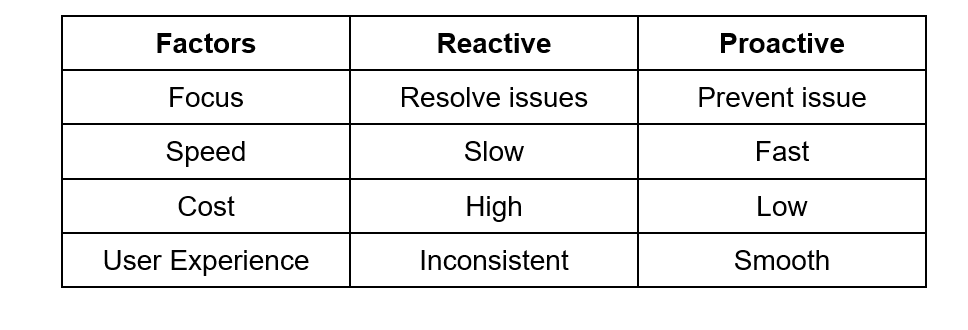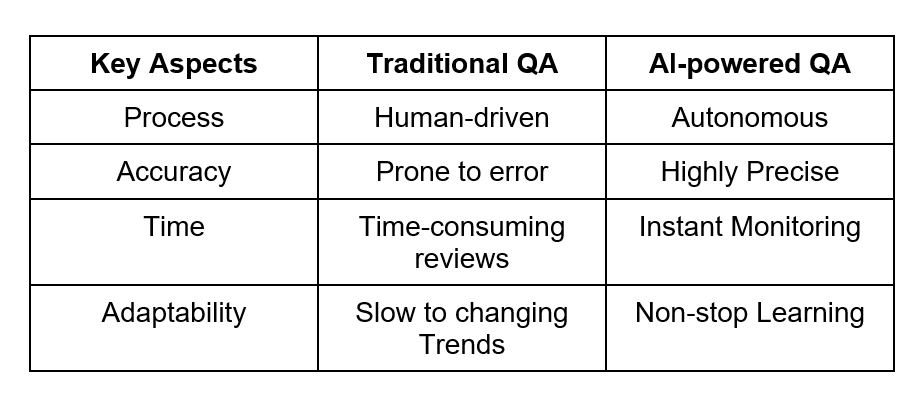ai-customer-service

Accelerate your Customer service quality assurance with AI automation. Lead the market with proactive solutions.
Innovation of Customer Service Quality Assurance
Customer service QA has advanced beyond simple regulatory inspections. Businesses must enhance their customer interactions regularly in this competitive age. This will help brands build strong reputations, allegiances, and customer satisfaction. AI-driven technology, data insights, and proactive solutions brought significant change in the quality assurance of customer service. Companies can solve emerging issues through modern service quality monitoring strategies.
● The Importance of Customer Support Evaluation
Quality assessment is the foundation to enhance customer support. It confirms consistent and accurate responses by monitoring interactions and recognizing the areas where improvement is required. This boosts the efficiency of overall service.
● Revolution of QA: Reactive to Proactive
For better results, brands are now preventing problems instead of solving them. It becomes possible with prescient analysis, live issue detection, and feedback reviewing. Which results in proactive solutions to predictive problems.

How AI is Transforming Service Excellence Monitoring
A huge advancement in service quality happens through AI. AI-powered Chatbots and machine learning help to analyze real-time data and learn through interactions, information insights, and customer needs. Making it more accurate and advanced and ultimately leveling up the businesses.
1. In-depth look at Client Interaction Quality Control
A structured framework to analyze and enhance service quality through interactions is called customer service quality assurance. Businesses must adapt QA strategies to evolving client expectations and maintain market dominance.
● Concept of Customer Service Quality Assurance (CSQA)?
It involves observing, reviewing, and refining customer engagement for exceptional service support. It focuses on the assistant’s performance, policy compliance, and conversation quality. A properly managed QA strategy enables the brand to find out gaps and strengthens overall efficiency.
● Difference between Traditional and AI-powered QA
Traditional QA involves manual oversight, selective sampling, and intuitive judgment, which makes the process time-consuming and narrow in scope. On the other hand, AI-powered QA transforms everything with automated solutions, machine learning, and real-time data processing which makes the process fast and easier

2. Complete Roadmap for AI Integration in Customer Service Quality assurance
A well-structured plan is important to leverage AI in customer service QA to enable smooth deployment, optimized workflows, and sustainable advancements. Here is the complete guide to incorporate AI for client satisfaction.
Step 1: Establish Customer-centric objectives
The first step is to identify customer-focused goals to implement AI. Understanding the audience’s needs can help to take further steps. Setting clear goals ensures alignment with the company’s target and delivers tangible results.
Step 2: Select the Right AI tool for Service Excellence
After setting goals, the second step is to choose an ideal tool. Select the AI tools with features like sentiment analysis, user insights, multilingual support, seamless integration, scalability, and continuous adaptability. The selected tool will work consistently with the current system alongside supporting business growth.
Companies like Amazon, Apple, Google, etc are using AI chatbots and thriving at high levels.
Step 3: Adopt AI to Streamline Customer Support Operation
Automated standard compliance lessens the need for manual solutions. It facilitates instant tracking, autonomous performance benchmarking, and pre-detection of discrepancies. Self-operating systems provide strategic guidance to augment decision-making.
Step 4: Track and FineTune AI Performance in Service Auditing
AI deployment is not a set-it or forget-it process. It requires ongoing refinement, tracking of QA data points, and fine-tuning algorithms to confirm accuracy and pertinence. AI is very precise but sometimes it fails to solve critical issues where it requires a human to handle the case. Regular maintenance results in smarter AI. The more you optimize it more it will give accuracy and will be customer-friendly. Regular upgrading is necessary for smooth working.
3. Impact of AI on Service Delivery Assessment
The use of AI in service delivery assessment will give various benefits. Like less time consumption as it will handle more interactions in less time compared to human agents. It will reduce human errors. It will give the same results across different platforms. Altogether it provides efficiency to the overall performance of service.
Summary
AI has the transformative power to generate exceptional results in customer service quality. Many businesses are using AI to improve client satisfaction. Features like emotional insights, fast data tracking, continuous adaptation through learning, and reliable responses make it accurate and vital need for business growth. Nevertheless, it’s not a one-time process — it demands continuous modification to meet the emerging trends for more efficiency and to stay ahead of the competition.
AI-powered customer service QA is the future proof — don’t lose ground. Revamp your QA approach today for long-term success.

